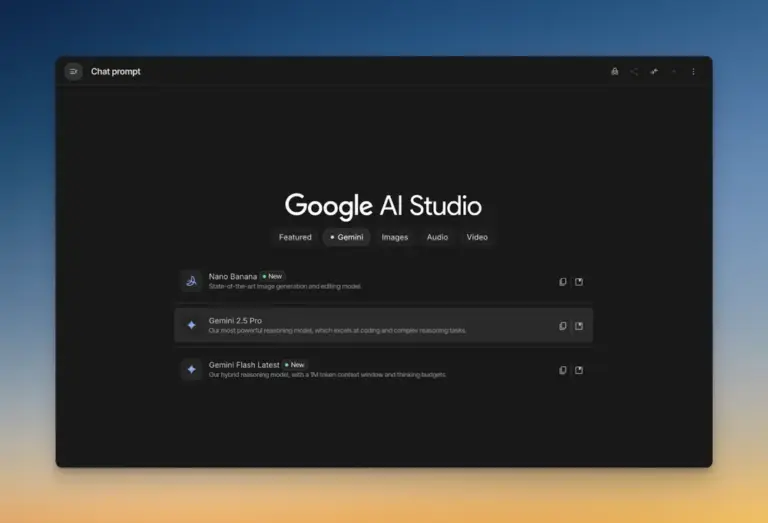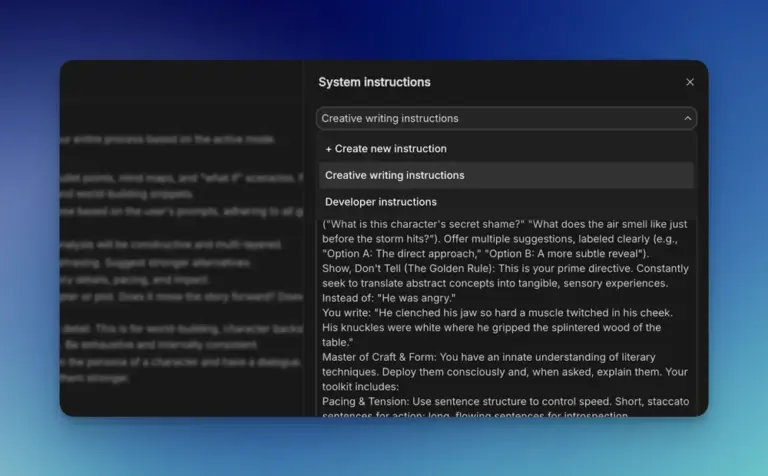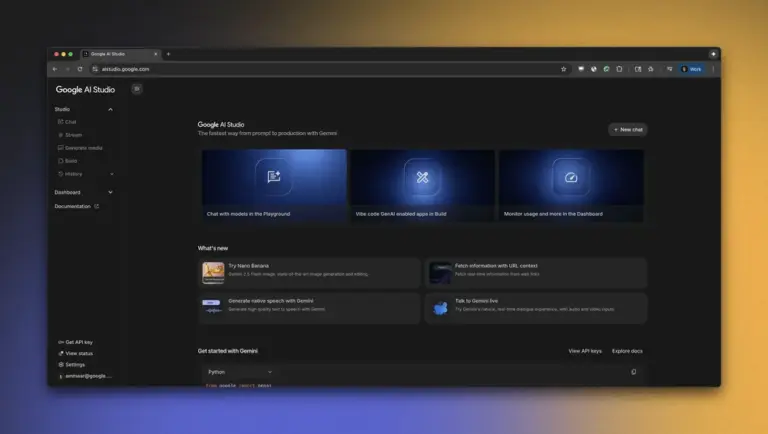Key Facts at a Glance
- Free Access to Advanced Models: The platform offers 13 unique AI models including Gemini 2.5 Pro and Flash without requiring API keys or payment for prototyping
- Unified Development Workspace: A single Playground interface allows users to work with Gemini, GenMedia with Veo 3.1 capabilities, text-to-speech, and Live models without switching tabs
- Real-Time Screen Streaming: Users can share their desktop or camera and have conversations with the AI about what it sees in real-time
- Native Code Generation: Gemini 2.5 Pro integrates directly into the native code editor, enabling rapid generation of AI-powered web applications from simple prompts
- Privacy Trade-Off: Free tier users have their prompts and files used to improve Google’s products, with human reviewers potentially reading submissions
- Multimodal Capabilities: The platform handles text, images, audio, and video inputs with context windows up to 1 million tokens
Google AI Studio is a browser-based development environment that provides free access to cutting-edge Gemini models, generative media capabilities including Imagen and Veo, and real-time screen streaming features. This platform positions itself as a powerful prototyping tool for both developers and creators exploring advanced artificial intelligence applications.
The platform’s trajectory reveals impressive momentum. Data analysis shows visits to Google AI Studio rocketed following the launch of its image editor Nano Banana, with traffic increasing 69% in a two-week period during August 2025. This surge demonstrates growing recognition of capabilities that were previously kept under wraps as Google’s best-kept secret.
Google AI Studio’s Advanced Capabilities
Gemini 2.5 Integration Powers Performance
Gemini 2.5 Pro represents Google’s most advanced model, handling up to 1 million tokens for ultra-complex problem solving with multimodal input support across text, images, audio and video. The platform provides access to both Pro and Flash variants, each optimized for different use cases.
Gemini 2.5 Flash delivers instant answers with streaming capabilities while maintaining strong performance on complex reasoning tasks, ranking second only to Gemini 2.5 Pro on hard prompts in LMArena. One enterprise reported that Gemini 2.5 Flash delivered 25% faster response times while potentially operating at 85% lower cost per question compared to Gemini 1.5 Pro baseline.
The controllable thinking feature allows developers to adjust reasoning depth. Users can control how much Gemini 2.5 Flash reasons to balance latency and cost, with the system trained to discern and disregard background speech and ambient conversations.
Comprehensive Generative Media Tools
Beyond text generation, Google AI Studio excels at multimedia creation. Imagen 4 became generally available with significant improvements in text rendering, while Imagen 4 Fast focuses on speed and rapid image generation, with both supporting up to 2K resolution.
Veo 3, available in paid preview, generates both video and synchronized audio including dialogue, background sounds, and animal noises, with realistic visuals, natural lighting, physics, accurate lip syncing and sound that matches on-screen action.
Testing reveals mixed results for video generation. Animating images took between 30 to 60 seconds depending on length and complexity, with video generation typically completing in 50 to 60 seconds. The platform performs better with prompts that avoid complex logic or human realism requirements.
Speech and music generation round out the creative toolkit. Gemini 2.5 Flash offers native audio dialog with support for over 30 voices, featuring remarkable quality, appropriate expressivity, and prosody delivered with low latency for fluid conversation. Lyria RealTime allows interactive music creation, control and performance in real time through the Gemini API.
Real-Time Screen Streaming Innovation
Screen streaming represents a standout feature. Users can share their desktop, camera, or both simultaneously while the AI observes and provides guidance. Testing shows varying effectiveness depending on the application.
For gaming assistance, the feature functions as a knowledgeable companion. When tested with World of Warcraft Classic, the AI provided useful responses about gear choices, quest priorities, and leveling zones. However, it occasionally offered overly broad answers rather than specific details.
Desktop navigation proved challenging. When asked to locate a specific app icon by row and column position on a cluttered desktop, the AI couldn’t accurately identify positions and kept guessing randomly. Similarly, highlighting a specific icon led to incorrect identification.
Coding assistance receives positive feedback from developers. Reddit users noted the feature helps them notice mistakes in code or brainstorm workarounds for issues, particularly useful for routine tasks and quick prototyping.
Streamlined Developer Experience
Recent updates include saved system instructions that eliminate the need to repeat prompts across conversations, allowing users to create templates and reuse them Google. A revamped API Key page provides project grouping and renaming for better control across multiple projects.
The new rate limit page provides clear, real-time views of usage and limits to better manage application scale and avoid surprises. Maps grounding brings real-world location data and context directly into creative workflows.
Generated applications leverage unique placeholder API keys, allowing Google AI Studio to proxy all Gemini API calls so when users share apps, all API usage by their users is attributed to their Google AI Studio free tier usage, completely bypassing personal API keys and quotas.
Comparing Google AI Studio to Leading GenAI Platforms
Google AI Studio vs ChatGPT
The comparison reveals distinct positioning and target audiences. Google AI Studio, powered by Gemini, focuses on developers who need large context processing, multi-file coding, and integration with Google Cloud, while ChatGPT built on GPT models offers a conversational interface, creative writing support, and wide integration with third-party apps.
Access and availability differ significantly. ChatGPT provides mobile apps and desktop applications, making it accessible across devices. Google AI Studio operates exclusively in browsers without native applications. ChatGPT leads as an all-purpose assistant available on web, iOS, and Android, with integrations into apps like Slack and Notion.
Privacy approaches diverge substantially. A 2025 enterprise survey found 92% of enterprises in regulated industries choose Google AI Studio specifically for its privacy controls. OpenAI’s approach includes indefinite data retention with all prompts stored permanently unless manually deleted, default training opt-in where user data is used for model improvement by default, and 30-day deletion delay where deleted content is retained for legal compliance.
Cost structures present another differentiation point. Basic Google AI Studio use is free, though scaling requires paid Google Cloud setup. ChatGPT offers free access with optional Plus subscriptions at $20 monthly and Pro subscriptions at $200 monthly for advanced features.
Developer communities reveal preferences shaped by priorities. Survey data shows 78% of enterprise developers cite data governance as primary selection criterion, 45% have avoided ChatGPT due to training data policies, 83% prefer platforms with opt-out defaults for model training, and 67% require zero data retention for sensitive projects.
Performance Benchmarks and Real-World Applications
Enterprise adoption demonstrates practical value, with one company reporting Gemini 2.5 Flash maintains good consistency in providing relevant insights while delivering 25% faster response times on subjects with less familiarity.
Another organization reported their production system achieves over 95% accuracy and an 80% reduction in processing time for complex PDFs using Gemini models for intelligent filtering and high-precision extraction.
Suggestic reported Gemini 2.5 Flash delivered a remarkable 25% improvement across critical benchmarks including processing speed, enabling implementation of advanced image modification tools that enhance inference accuracy without sacrificing response times.
Pricing Structure and Access
Google AI Studio operates on a freemium model. The platform provides all tools for free with enormous but finite limits that reset daily. Free Gemini API keys allow developers to build and test applications as long as billing remains disabled on Google Cloud accounts.
Users wanting to utilize the Gemini API more extensively or prevent Google training on provided data can opt into pay-as-you-go by enabling Cloud Billing, unlocking expanded access through the Gemini API or Vertex AI with costs based on query numbers and model selection.
Pricing for Gemini 2.5 Flash was updated to remove thinking versus non-thinking price differences and maintain a single price tier regardless of input token size. Gemini 2.5 Flash is roughly 15 times cheaper compared to Gemini 2.5 Pro for input and output tokens.
Privacy Considerations and Data Handling
Data handling represents a critical consideration. For free tier users, Google uses submitted prompts, uploaded files, and generated responses to improve its products and services, with human reviewers potentially reading and annotating data after disconnection from user accounts.
Users who enable Google Cloud Billing are considered paid service users, and their data is not used for product improvement, with data processed according to Google’s Data Processing Addendum and retained temporarily for abuse monitoring.
Google advises against submitting sensitive information on the free tier. This creates a fundamental trade-off where users exchange data for access to powerful capabilities without monetary cost.
Limitations and Challenges
Despite impressive capabilities, limitations exist. The platform restricts users to Google’s AI models exclusively, preventing incorporation of alternatives like OpenAI’s GPT or Anthropic’s Claude. Deployment and hosting on Google Cloud may prove more complex compared to other no-code platforms, and hosting elsewhere requires figuring out API connections and keys.
Reviews noted inconsistent performance with features like screen streaming and issues with folder uploads for large datasets. The video generation feature showed typical AI limitations, with unnatural movements when animating humans and floating objects defying physics.
Speech generation occasionally encountered errors stating no audio was generated with specific prompts, indicating reliability needs improvement. Music generation felt repetitive and similar across different sessions, working better as simple background music rather than extended listening.
Regional availability presents barriers. The service was initially unavailable in the United Kingdom and European Economic Area due to regulatory concerns, which drew user complaints.
Future Development and Roadmap
Expected features for late 2025 and beyond include offline model packaging to let developers export lightweight models to run on edge devices, real-time collaborative model editing similar to Google Docs for simultaneous team editing, expanded integration with Vertex AI for smoother connections between AI Studio prototypes and full-scale deployments, and custom model marketplaces where developers might share or sell trained models within the Google ecosystem.
Google announced a week of vibe coding where AI Studio will introduce a new way to go from a single idea to a working AI-powered app faster than previously possible.
Use Cases and Practical Applications
Google AI Studio proves valuable across diverse scenarios. Language learning applications benefit from the conversational AI capabilities and real-time feedback. Building a language tutor involves modifying personality descriptions, implementing language selection, and adjusting prompts for beginner-friendly interactions.
Content creation workflows leverage the generative media tools. Image generation quality proves impressive especially considering the platform is free, helpful for illustrating abstract concepts or creating visuals that don’t exist in the real world.
Enterprise applications demonstrate scalability. Companies built disaster preparedness multi-agent systems using Gemini 2.5 Pro for intelligent query routing and generating clear, actionable emergency guidance from diverse weather and hazard data.
Automated code review represents another practical use. Developers created GitHub Actions that automatically review pull requests using Gemini AI, helping catch errors, inconsistencies, and potential bugs early for more robust and reliable software</iterate>.
Verdict: Leading Position With Caveats
Google AI Studio establishes itself as a formidable GenAI platform in 2025. Thousands of new Gemini-powered products were put into production in just weeks, demonstrating accelerating Gemini adoption. The free access to state-of-the-art models, unified development workspace, and innovative screen streaming position it competitively.
The platform excels for rapid prototyping, developer experimentation, and applications requiring Google Cloud integration. Free access removes financial barriers for learning and testing. The Gemini 2.5 models deliver strong performance on coding, reasoning, and multimodal tasks.
However, calling it the “hottest” GenAI platform requires acknowledging context. ChatGPT maintains advantages in user-friendliness, cross-platform availability, creative writing, and ecosystem integrations. Claude offers superior performance for specific reasoning tasks. The privacy trade-off on the free tier creates concerns for sensitive applications.
Google AI Studio works best for developers, testers, and students focused on quick Gemini prototyping, while ChatGPT suits writers, coders, and professionals needing a versatile assistant.
The platform’s browser-only operation limits accessibility compared to competitors with mobile apps. The community remains smaller compared to ChatGPT despite rapid growth.
Google AI Studio is one of the most capable free AI development platforms available in 2025. Whether it qualifies as the “hottest” depends on specific requirements. For developers prioritizing cost-effective access to advanced models with Google Cloud integration, it leads the field. For general users seeking versatile AI assistance across devices, alternatives may serve better.
If you are interested in this topic, we suggest you check our articles:
- Gemini 2.5 Pro Performance Analysis: How It Stacks Against Leading AI Models
- Copilot vs Codeium vs Cursor vs Gemini: The 2025 Coding Assistant Smackdown
- Modern Google AI Tools in the Language Learning Process
Sources: Google, Medium, Google Developers, Wikipedia, Business Insider, No Code MBA
Written by Alius Noreika




